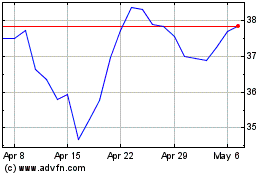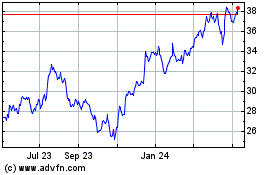By Christina Rexrode
Joel Liberson's mortgage lawsuits against Bank of America Corp.
and Wells Fargo & Co. follow a now-familiar template: accuse
big banks of targeting minority borrowers with unfair loans that
fed a housing crisis.
What is unusual is his client. Mr. Liberson, a 52-year-old
lawyer who has devoted much of his career to defending apartment
dwellers from eviction, is suing on behalf of the city of Miami. In
the lawsuits, Miami blames the banks for widespread declines in
property values and tax revenue, and increased expenses for police,
fire and other services, due to the burdens of mass
foreclosures.
The banks, which already shelled out tens of billions of dollars
for mortgage-related settlements with federal and state governments
since the financial crisis, have challenged whether the city has
the right to sue. The Supreme Court in June agreed to take up the
question and is likely to hear oral arguments in the fall and will
decide by July 2017.
The court's decision potentially could reshape the breadth and
use of the Fair Housing Act, a landmark civil-rights statute that
forbids discrimination in real-estate lending, rental property and
other areas of the housing industry.
The banks said Miami is stretching the bounds of a law meant to
integrate neighborhoods, not fill tax coffers. They also dispute
that Miami has proved its economic woes are a direct result of the
banks' actions.
In a legal filing, Wells Fargo said its lending practices "did
not cause the City's financial difficulties any more than they
caused the City to thrive in the years leading up to the financial
crisis." Bank of America expressed a similar sentiment in its
filings.
The banks believe a Supreme Court decision siding with Miami
will leave them vulnerable to a torrent of mortgage litigation from
anyone who said they were harmed by the housing bubble. Lobbyists
warn that banks might curtail lending in urban neighborhoods
because of the legal risk.
The city and its attorney disagree. The Supreme Court has
traditionally been lenient in interpreting the Fair Housing Act,
according to academics who study the issue. Last year, for example,
it ruled such lawsuits can be brought without proof of intentional
bias.
In Mr. Liberson's view, a ruling in the banks' favor would limit
an important weapon borrowers have wielded in housing lawsuits for
decades, leaving them more vulnerable to questionable loans.
"What happens to a city when houses go vacant?" Mr. Liberson
said. "Everybody suffers."
Mr. Liberson has spent the past several years encouraging
cash-strapped cities to sue the banks under the Fair Housing Act.
He has enlisted help from bigger plaintiffs' firms and big-name
legal talent, including Erwin Chemerinsky, dean of the law school
at the University of California, Irvine, and author of a popular
textbook on constitutional law. But Mr. Liberson often works alone,
hunched over a smudged Lenovo ThinkPad laptop at coffee shops and
public libraries, manning the firm he named Trial & Appellate
Resources.
Mr. Liberson, who lives in New York, is overseeing similar
lawsuits on behalf of Los Angeles, Oakland, Calif., and Miami
Gardens, Fla.
A ruling in Miami's favor could recharge those suits, which are
pending. It could do the same for similar lawsuits by Atlanta-area
counties and Cook County in Illinois, both spearheaded by a small
firm in Georgia. Some municipal officials believe their cities
could be in line for tens of millions of dollars or more, with a
cut for Mr. Liberson, if they eventually win. A ruling against Mr.
Liberson could cripple those claims.
"If the Supreme Court finds standing for the city, then you'll
see a lot more of these lawsuits," said George Rutherglen, a
professor at the University of Virginia School of Law. "And if not,
then the court is retrenching on a very broad approach to
litigation under the Fair Housing Act."
The legal process has taken longer than Mr. Liberson expected,
but he said the strategy has worked before. Wells Fargo in 2012
resolved charges of race-based housing discrimination brought by
the city of Baltimore. That agreement was wrapped into a larger
settlement by the Justice Department.
It was while that case was pending that Mr. Liberson started
approaching other cities to see if they were interested in doing
the same. The sooner you file, the sooner you can get your money,
he told them, with reassurances that the banks tended to settle
such lawsuits and resolve them quickly.
Francis Suarez, a Miami city commissioner, remembers when Mr.
Liberson came to him around early 2013 with an offer to work on a
contingency basis. "It was kind of a no-brainer," Mr. Suarez said.
"We have the opportunity to vindicate the city for its residents,
and we don't have to front the money."
Mr. Liberson declined to say how the cases were being
financed.
Miami also is suing Citigroup Inc. and J.P. Morgan Chase &
Co., although those cases aren't before the Supreme Court.
Citigroup and J.P. Morgan have denied Miami's accusations.
Mr. Suarez, a real-estate lawyer who is running for mayor, said
that if the lawsuits are successful, he would like to use the money
to pay for police, fire, park and library services, and affordable
housing, among others.
Even if Miami wins in the Supreme Court, a payout isn't
guaranteed. The banks have previously argued they didn't make
racially discriminatory loans, and that the statute of limitations
for filing such claims has expired. Those arguments likely would
come up again in district court.
And banks are fighting back more against housing-crisis cases.
Bank of America recently won an appeal to overturn Justice
Department accusations and a jury finding of mortgage-securities
fraud.
Write to Christina Rexrode at christina.rexrode@wsj.com
(END) Dow Jones Newswires
August 03, 2016 02:47 ET (06:47 GMT)
Copyright (c) 2016 Dow Jones & Company, Inc.
Bank of America (NYSE:BAC)
Historical Stock Chart
From Mar 2024 to Apr 2024

Bank of America (NYSE:BAC)
Historical Stock Chart
From Apr 2023 to Apr 2024
